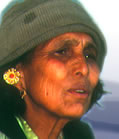THEMES IN THIS
TESTIMONY
Development

Politics

Water

Click on arrows
to find more
testimonies
featuring
these themes
|
|
Sex
|
male
|
|
|
Age
|
66
|
|
|
Identity
|
N
|
|
|
Occupation
|
|
|
|
Location
|
Melamchi, Sindhupalchok
|
|
|
Date
|
1998
|
|
summary
This is one of the water testimonies of which we do not have a full transcript. It is the interviewer’s edited version of the testimony and does not include any questions top the narrator.
This is a short testimony focusing on an irrigation canal previously used by Bishwanath and his fellow villagers. The narrator explains that this canal has now been blocked by a road which was built for the purposes of the Melamchi project which was “conceived to take water to Kathmandu.” He explains that although they didn’t need to use water from a canal in summer, the canal enabled them to plant rice in the winter months – an important bonus.
He describes how the villagers built the canal with no outside assistance: “There were no drawings and no overseer. There were no measurements then, no pegs were placed and no ropes used… Some would engage in clearing the area, others in digging, still others in guiding the water through and some others in filling up depressions. Believe me, water would reach exactly where we intended.” Villagers also worked together to repair the canal: “With many people at work, we could complete the repair in two-three days, always motivated by the thought that the sooner we could get the water to flow along the canal, the earlier we could cultivate our land.”
The testimony ends sadly with the narrator doubting the Melamchi Project’s promise to mend the canal: “The old canal has disappeared, and we have no alternative. I am worried that all the paddy fields will lie barren.”
detailed breakdown
|
You will need a password from Panos to view the full
transcript of the interview. To apply for a password, click here.
Once you have a password, click here to go to the beginning
of the transcript. You can also click on any section of the
breakdown of content below and go straight to the
corresponding part of the transcript.
|
| Section 1 |
“We had one community irrigation canal. This canal has now been blocked by the road construction work for the Melamchi Drinking Water Project.”
Without the canal they cannot cultivate winter paddy.
Irrigation was worked out on a rotation basis: “It was mandatory for every household to contribute labour to maintain the canal. Those who did not come to work, naturally got their turn last.”
|
| Section 1-2 |
Irrigation and the timing of planting and cultivating crops
|
| Section 2 |
Describes the traditional methods of making a canal
Return to talk about the loss of the canal: he doesn’t believe that the project will repair it to its former state. |
|


